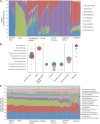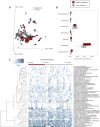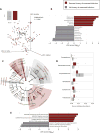The placenta harbors a unique microbiome
- PMID: 24848255
- PMCID: PMC4929217
- DOI: 10.1126/scitranslmed.3008599
The placenta harbors a unique microbiome
Abstract
Humans and their microbiomes have coevolved as a physiologic community composed of distinct body site niches with metabolic and antigenic diversity. The placental microbiome has not been robustly interrogated, despite recent demonstrations of intracellular bacteria with diverse metabolic and immune regulatory functions. A population-based cohort of placental specimens collected under sterile conditions from 320 subjects with extensive clinical data was established for comparative 16S ribosomal DNA-based and whole-genome shotgun (WGS) metagenomic studies. Identified taxa and their gene carriage patterns were compared to other human body site niches, including the oral, skin, airway (nasal), vaginal, and gut microbiomes from nonpregnant controls. We characterized a unique placental microbiome niche, composed of nonpathogenic commensal microbiota from the Firmicutes, Tenericutes, Proteobacteria, Bacteroidetes, and Fusobacteria phyla. In aggregate, the placental microbiome profiles were most akin (Bray-Curtis dissimilarity <0.3) to the human oral microbiome. 16S-based operational taxonomic unit analyses revealed associations of the placental microbiome with a remote history of antenatal infection (permutational multivariate analysis of variance, P = 0.006), such as urinary tract infection in the first trimester, as well as with preterm birth <37 weeks (P = 0.001).
Copyright © 2014, American Association for the Advancement of Science.
Conflict of interest statement
Figures




Comment in
-
Comment on "the placenta harbors a unique microbiome".Sci Transl Med. 2014 Sep 17;6(254):254le4. doi: 10.1126/scitranslmed.3009864. Sci Transl Med. 2014. PMID: 25232175 No abstract available.
-
Author response to comment on "the placenta harbors a unique microbiome".Sci Transl Med. 2014 Sep 17;6(254):254lr3. doi: 10.1126/scitranslmed.3010007. Sci Transl Med. 2014. PMID: 25232176 No abstract available.
References
-
- Aagaard K, Petrosino J, Keitel W, Watson M, Katancik J, Garcia N, Patel S, Cutting M, Madden T, Hamilton H, Harris E, Gevers D, Simone G, McInnes P, Versalovic J. The Human Microbiome Project strategy for comprehensive sampling of the human microbiome and why it matters. FASEB J. 2013;27:1012–1022. - PMC - PubMed
-
- Aagaard K, Riehle K, Ma J, Segata N, Mistretta TA, Coarfa C, Raza S, Rosenbaum S, Van den Veyver I, Milosavljevic A, Gevers D, Huttenhower C, Petrosino J, Versalovic J. A metagenomic approach to characterization of the vaginal microbiome signature in pregnancy. PLOS One. 2012;7:e36466. - PMC - PubMed
-
- Mackie RI, Sghir A, Gaskins HR. Developmental microbial ecology of the neonatal gastrointestinal tract. Am J Clin Nutr. 1999;69:1035S–1045S. - PubMed
Publication types
MeSH terms
Substances
Grants and funding
LinkOut - more resources
Full Text Sources
Other Literature Sources
Medical

